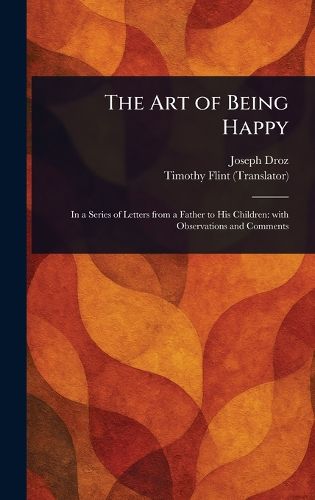Readings Newsletter
Become a Readings Member to make your shopping experience even easier.
Sign in or sign up for free!
You’re not far away from qualifying for FREE standard shipping within Australia
You’ve qualified for FREE standard shipping within Australia
The cart is loading…






This title is printed to order. This book may have been self-published. If so, we cannot guarantee the quality of the content. In the main most books will have gone through the editing process however some may not. We therefore suggest that you be aware of this before ordering this book. If in doubt check either the author or publisher’s details as we are unable to accept any returns unless they are faulty. Please contact us if you have any questions.
Discover timeless wisdom in "The Art of Being Happy," a classic guide to cultivating happiness, virtue, and a fulfilling life. Authored by Joseph Droz, this collection of letters from a father to his children explores the principles of morality and ethics, offering practical advice for self-improvement and personal growth.
Presented as thoughtful observations and comments, Droz's work delves into the heart of what it means to live a virtuous life and achieve lasting happiness. This enduring text, categorized under Philosophy & Psychology and Self-Help, provides invaluable insights into the human condition and the pursuit of well-being. Explore the timeless principles outlined in "The Art of Being Happy" and embark on a journey toward a more ethical, moral, and ultimately happier existence.
This work has been selected by scholars as being culturally important, and is part of the knowledge base of civilization as we know it.
This work is in the public domain in the United States of America, and possibly other nations. Within the United States, you may freely copy and distribute this work, as no entity (individual or corporate) has a copyright on the body of the work.
Scholars believe, and we concur, that this work is important enough to be preserved, reproduced, and made generally available to the public. We appreciate your support of the preservation process, and thank you for being an important part of keeping this knowledge alive and relevant.
$9.00 standard shipping within Australia
FREE standard shipping within Australia for orders over $100.00
Express & International shipping calculated at checkout
This title is printed to order. This book may have been self-published. If so, we cannot guarantee the quality of the content. In the main most books will have gone through the editing process however some may not. We therefore suggest that you be aware of this before ordering this book. If in doubt check either the author or publisher’s details as we are unable to accept any returns unless they are faulty. Please contact us if you have any questions.
Discover timeless wisdom in "The Art of Being Happy," a classic guide to cultivating happiness, virtue, and a fulfilling life. Authored by Joseph Droz, this collection of letters from a father to his children explores the principles of morality and ethics, offering practical advice for self-improvement and personal growth.
Presented as thoughtful observations and comments, Droz's work delves into the heart of what it means to live a virtuous life and achieve lasting happiness. This enduring text, categorized under Philosophy & Psychology and Self-Help, provides invaluable insights into the human condition and the pursuit of well-being. Explore the timeless principles outlined in "The Art of Being Happy" and embark on a journey toward a more ethical, moral, and ultimately happier existence.
This work has been selected by scholars as being culturally important, and is part of the knowledge base of civilization as we know it.
This work is in the public domain in the United States of America, and possibly other nations. Within the United States, you may freely copy and distribute this work, as no entity (individual or corporate) has a copyright on the body of the work.
Scholars believe, and we concur, that this work is important enough to be preserved, reproduced, and made generally available to the public. We appreciate your support of the preservation process, and thank you for being an important part of keeping this knowledge alive and relevant.